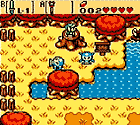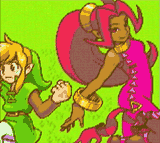 | The Legend Of Zelda: Oracle Of Seasons - Review |  |
This Place Needs Environmental Controls... By: Zachary Lewis
| Review Breakdown |
| Battle System |
8 |
| Interface |
9 |
| Music/Sound |
8 |
| Originality |
5 |
| Plot |
3 |
| Localization |
8 |
| Replay Value |
9 |
| Visuals |
9 |
| Difficulty |
Easy |
| Time to Complete |
5-25 hours | | | Overall |  |
| Criteria |
Through the years, Nintendo has made countless games, and gathered fanatical legions of followers the world over. One name among the many that have catapulted them into the hearts of their fans is The Legend Of Zelda. Although it can be fiercely debated as to whether or not the Zelda games are actually RPGs, they have a mystique and aura about them that makes it hard for a gamer to put them down once they start playing. When the gamers of the world discovered that Nintendo was developing the latest Zelda games outside their own company for the first time, many of them were aghast at the possibilities. But, as with so many things, that which seems most dark, can - in fact - become the greatest thing that a saga has seen in many long ages...
Oracle Of Seasons is one of two games in the Zelda saga released on the same day that have an intertwining storyline. This marks another major first in the series as, up until this point, the plots of each game have only been nebulously inter-linked by the common threads of names, and personalities. Aside from this atypical part of the games' design, nearly everything else can be easily compared to Link's Awakening or A Link To The Past. Foremost among the similarities is the battle system. It is - for all intents and purposes - identical to any other 2 dimensional Zelda game. You move Link around the map and, by changing the equipment held in your hands, attack enemies and manipulate objects. In addition to the usual 2/3 top view of most of the previous games, Oracle Of Seasons also returns the side view aspect seen in Link's Awakening. Between the two navigation types, most any Zelda fan should feel right at home.
 | | Holodrum: One Land Beyond Hyrule | |
As mentioned above, Seasons has a plot that is directly effected by whether you complete the games' counterpart, Oracle Of Ages, first. By completing the quest in Labrynna and defeating Veran, the sorceress, you know more about the true nature of the story. One part that remains static regardless, is that it is your quest to rescue Din, the Oracle Of Seasons, from the clutches of Onox, the Dark General. Without Din, the land of Holodrum is doomed to have the seasons change randomly for all time. Winter could follow Spring from one moment to the next, just as Summer could remain for years and years. As you traverse Holodrum's various regions and explore the 8 dungeons, you collect more powerful items that help you to more fully explore everything. Sadly, these plot devices aren't a lot different than those used in every episode of the Zelda series. The fact that you've seemingly done all of this before doesn't make the game any less fun, though.
One question that commonly comes up is whether or not Koji Kondo's original Zelda theme music has returned. In a sense, it has. It is used throughout the game in a number of slightly changed versions of itself, as well as for the primary map music. The classic sound effects for when you pick up items or solve a puzzle have also come back to call on the newest generation of Zelda followers. All-in-all, the sounds of Oracle Of Seasons cover everything from the primary nostalgic points, to some of the best composing available on the withering GameBoy Color. With the music being such a wonderful chance to relive the Zelda feelings of old, it's no small wonder that the graphics of the game are true to the original, as well. Everything is very lively and colored in brilliant shades, primarily to show off the whimsical nature of the series. Much like the anticipated GBC RPG 'Mythri', OoS features anime-style, still cut scenes throughout the game to emphasize plot points. These truly show what the GBC is capable of.
 | | Thus, Link Fails His Interpretive Dance Class | |
Menus and sub-screens are easily navigable and use very few text lists. Everything in Zelda - for time out of mind - has typically been done with icons to represent things, and Seasons is no different. One part of the game that isn't as typical of Nintendo's quality controls, is the localization of the game. Although the work done in translating the game is good, it is far from perfect. Several key parts of the game have a fair amount of text that needs to be read. The difficulty arises from the phrasing of certain subjects, such as where you need to go from one mission to the next. On the plus side, many of the characters have witty things to say, and what each individual tells Link changes as he recovers the various Essences Of Nature.
With the various connectability options available to the game, Seasons is a great game to try over again a second time. It's also worthy of note that there are at least 2 complete play-throughs of material in the game, based on whether you own Oracle Of Ages or not. Even with all this replay power in its' corner, the game is still strangely short. Granted, it's on the GameBoy, but so is the remake of Dragon Warrior 3 - which is a huge game, to be sure. Short and easy tend to flock together where RPGs come in. Zelda games are rarely difficult, rather than just frustrating. A good comparison to the difficulty you should expect is in Link's Awakening, or perhaps A Link To The Past.
Although Zelda might seem to be wearing thin over the years, and even though the GameBoy Color is fading into the mists of time, Oracle Of Seasons is a fantastic game that is packed to the brim with fun and adventure. Any Zelda fan, or any action RPG lover should thoroughly enjoy the game.
|










